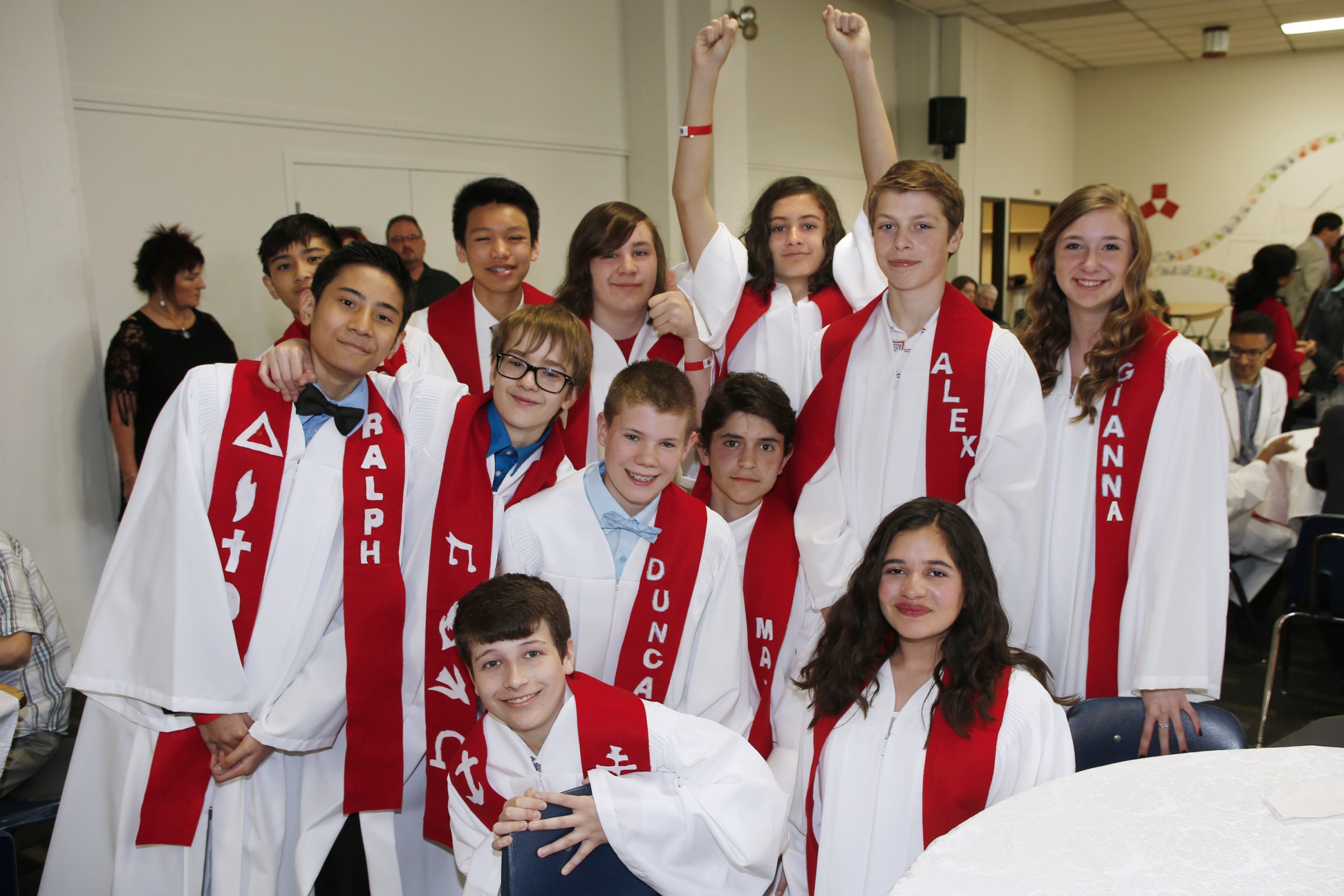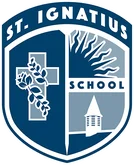The Middle Years can be a challenging time as children grow quickly emotionally, physically, and intellectually.
Our curriculum is designed to engage their minds and support their learning and organization skills. Leadership opportunities help students become more independent.
Along with core subjects, students gain experience through shops and language programs. They are also encouraged to join extra-curricular activities to expand their skills and learning beyond the classroom.

FAITH FORMATION
We recognize that parents are the primary faith educators of their children. We encourage families to continue to develop and deepen their faith through family prayer, participation in parish masses and sacraments, and community outreach.
Religious Education
St. Ignatius School employs the Canadian Conference of Catholic Bishops’ full catechetical program as a daily component of the school’s academic life. Students in grades 7 and 8 receive daily instruction in religion. In addition to regular catechetical instruction, the school responds to the mission of Catholic schools by integrating the values and beliefs of the Catholic faith into all aspects of the school’s academic program.
Sacramental Preparation
Sacramental preparation for Confirmation (Grade 8) is included in our educational mandate. The preparation for receiving this sacrament is a joint undertaking involving parents, the school, and the parish. Your child will receive instruction in the classroom and you will assist in preparing them at home. Information about this process will be distributed by the classroom teacher.
Prayer
Each school day begins with prayer. We encourage families to develop rituals around daily prayer such as grace at meals, bedtime prayers, or praying for special intentions.
Participating in Sacramental and Liturgical Celebrations
Mass/liturgical celebrations are scheduled throughout the school year as identified on the school calendar. Parents are welcome and encouraged to attend. There are also opportunities throughout the school year for students to participate in the sacrament of reconciliation as identified on the school calendar.
Community Service/Social Justice Initiatives
We believe in putting faith in action through community service experiences and social justice initiatives. We teach our students to research, discuss, and respond to needs within our community.

English Language Arts
Learning is a complex process of discovery, collaboration, and inquiry which is facilitated by language; consequently, the development of the six language arts will be the focus in this course. Language learning is an active process which is continual, and at times, recursive because of its integrated nature. Through involvement in reading and writing workshops, students will be given opportunities to become proficient in all of the language arts. Their learning opportunities will promote reflective thinking so progress can be planned, monitored, and assessed.
Core Learning Outcomes
- Explore thoughts, ideas, feelings and experiences;
- Comprehend and respond personally and critically to oral, literary and media texts;
- Manage ideas and information;
- Enhance the clarity and artistry of communication; and
- Celebrate and build community.
English Assignments
Specifically in writing, the students will study three genres – narrative, expository and persuasive writing. At the beginning of each term, genre outlines and requirements will be given to every student so they can understand and plan their studies. Through class focus lessons, we will co-create criteria which will guide writing and facilitate self and peer assessment. Students will be required to write on a regular basis, using all of the steps of the writing process. Topic choice will be open, and students will be given a number of opportunities for mastery before being assessed.
Mathematics
Through the core areas and topics covered in this course, students learn to value mathematics, reason and communicate mathematically, and become confident in their problem solving abilities. Interwoven throughout the curriculum are seven themes: communication, connections, number sense, visualization, technology, reasoning, and problem solving.
Core Learning Areas
Number: number concepts and number operations
Patterns and Relations: patterns, variables, equations, relations and functions
Statistics and Probability: data analysis and chance and uncertaintly
Shape and Space: measurement, 3D objects, 2D shapes and transformations
Science
Science is designed to engage students in laboratory activities, class activities, and projects that examine the fundamental processes and skills of science.
Interwoven throughout the curriculum are several general learning outcomes. These are skills and attitudes identified as being important in helping students to gain a measure of scientific literacy that will assist them in becoming informed, productive and fulfilled members of society. They can be grouped under five categories:
- Nature of Science and Technology
- Science, Technology, Society, and the Environment
- Scientific and Technological Skills and Attitudes
- Essential Science Knowledge
- Unifying Concepts
Social Studies
Through the social studies program, students will ascertain what kind of learner they are. They will also be exposed to a variety of study techniques and strategies. Assignments and participation will take the form of presentations, project work, research, visual representations, quizzes, tests, and lesson responses.
Grade 7
This course focuses on the relationships and interdependence of the physical and social environments of our Earth. Students are challenged to view the world as an interdependent whole in which they are to share the responsibility for improvement and stewardship.
Specific Topics Include:
- Geography
- Global Citizenship
- hunger
- water and Health
- Education
- War and Development
- Child Labour
Grade 8
This course is designed to help students explore the ways people lived within certain societies of the past and begin to realize that life today is closely related to developments which have occurred through the ages.
Specific Topics Include:
- Creation
- Geological timeframes
- Early people
- Ancient Civilizations
- Greece/Rome
- Medieval and Renaissance people
- Modern times
French Program
The French program at St. Ignatius School continues in Grades 7 and 8. Students receive approximately 160 minutes of French instruction per school cycle under the direction of M. Banka. He believes that learning another language helps students understand and appreciate different cultures.
French is taught using a balanced literacy approach in which students are involved in real-life, meaningful interactions in French. This approach supports increased language proficiency and engagement. Teaching methodology follows the cycle of speaking-reading-writing, with a particular emphasis on oral communication.
Course Objectives
The French program will enable students to:
- Acquire the necessary language skills to communicate in French
- Value the learning of French as a tool for personal, intellectual, and social growth
- Demonstrate an appreciation of Francophone cultures
- Further develop intercultural communication skills that are essential to all global citizens.
Ideas for Improving Language Skills
Here are some ways students can enhance their French language skills outside of the classroom.
- Watch a movie in French. Listen to CKXL radio, live from St.Boniface at 91.1 FM
- Play a game on a French website · Install a French app (ex. French For Life and Radio Canada.
Industrial Arts and Home Economics
Students in grades 7 and 8 attend home economics and industrial arts classes at Kelvin High School through the provision of a shared service agreement with The Winnipeg School Division.
Classes take place one afternoon of each six-day school cycle. Each day 4, students will be required to eat their lunch at school and will be dismissed at 12:35 p.m. to walk as a group to Kelvin High School. Students who normally eat their lunch at home must return to St. Ignatius School in time to walk with their classmates. Students will be dismissed from Kelvin High School at 3:30 p.m. and should go directly home or return to St. Ignatius School. As ambassadors of our school, students are expected to conduct themselves with maturity when travelling between schools on these days.
Students will rotate through four areas at Kelvin High School. The following courses make up the areas of rotation:
Graphics
Students learn the principles of planning and design, and apply these skills and principles to electricity and electronics. Through the design process, they'll adapt an existing product and create a student initiated product.
Clothing and Textiles
Students learn safety expectations, identify basic pattern symbols, operate a sewing machine and follow written instructions to construct a simple garment.
Metals
An introduction to the safety, product and processes used in modern metal fabrication with the emphasis on a hands-on approach. Students will build up to five small projects. The second year of Art Metal offers a greater degree of difficulty and skills.
Woodworking
Emphasis is placed on personal safety, shop safety, woodworking hand tools, some power machines and wood processes. Through the use of hand and power tools, 2-3 projects are completed in the term. Students can work independently in a fun, positive and productive industrial setting.
Physical Education/Health Education
The Physical Education Program at St Ignatius School endeavours to enhance the health of all students mind, body and spirit. An array of opportunities – competitive, developmental, team and individual – are designed to promote student success. Student feedback and ideas will be considered for program enhancement. Skills development and appreciation for recreational activities are balanced to develop the knowledge, skills, and attitudes for physically active and healthy lifestyles. This program endeavours to accomplish the following learning outcomes:
Movement - Skill development in a variety of sports such as volleyball, track and field, and low-organized games.
Fitness Management – The development and follow through of a personal fitness plan.
Safety - The development of safe and responsible decision making in order to manage risks and prevent injuries in daily living.
Personal and Social Management – the development of self-understanding and strategies necessary to build positive relationships with others.
Healthy Lifestyle Practices – The development of informed decision making in personal health, active living, and nutritional practices.
